
A lottery is a process of distributing something (usually money or prizes) by chance among a group of people. Lotteries are often organized to provide funding for projects such as building or renovating schools and hospitals, as well as to supply weapons and supplies for a military campaign.
In general, a lottery is defined by three requirements: payment for a chance to win a prize; the chance of winning a prize; and the type of prize. Several other elements may also be involved, including the frequency of drawings or permutations of the numbers used on tickets.
First, the pool of tickets that have been purchased must be determined. It should contain a balance between large and small prizes, preferably with enough to give each winner a good opportunity to win.
Second, a percentage of the pool’s revenues and profits must go to good causes. This is done to promote a sense of fairness and increase the number of winners, while ensuring that the proceeds are not wasted.
Third, the prizes must be attractive to players. The prize sizes should be high enough to encourage players to purchase more tickets than are needed for smaller prizes, but not so high that they become too expensive for many participants.
Fourth, the winner must be given a choice of how to receive his or her prize: as a lump sum or over a specified period of time. A lump sum usually makes the most sense for taxation purposes, while annual installments can be less advisable.